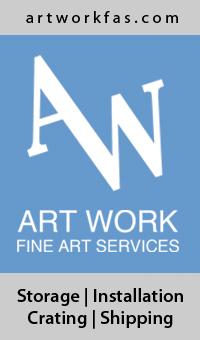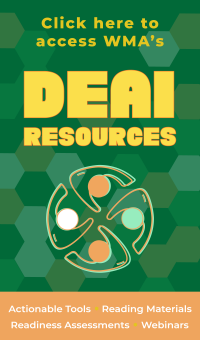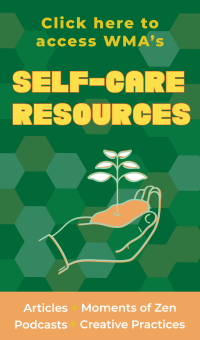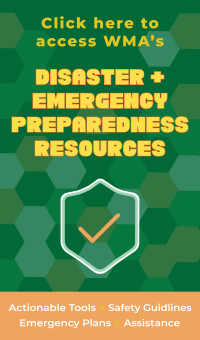
The Western Museums Association (WMA) understands that it is important to continuously develop your profession, whether you're connecting with professional peers, learning new skills, or expanding your perspectives; and WMA's Annual Meeting is a professional development opportunity like no other.
Through the Annual Meeting, WMA offers a cross-disciplinary approach that gives you the opportunity to expand your current abilities and develop the capacity to see your specialty in the context of the whole museum field. But like most, if you're a working professional, student, or intern with limited resources, you might be wondering how you can justify your attendance.
WMA offers this Justification Toolkit - a free resource to help you demonstrate the rewards of the investment of your attendance to your supervisors or organization. By verbalizing the quantity of new skills that you will learn, the networking opportunities that will be available, and the ultimate benefits attendees bring back to their organizations, you can strengthen your case for receiving support.
Justification Toolkit
Here are some simple ways the WMA Annual Meeting can advance your professional skill sets:
- Learn from museum industry leaders and colleagues throughout the field who all present invaluable lessons and research during WMA's sessions, workshops, and other learning opportunities. Hearing about the ideas, programs, and real-world case studies of other cultural organizations is a wonderful opportunity to learn, and then apply what you've learned back within your own institution.
- Network with hundreds of professional peers and leaders from all museum disciplines and form lasting connections. The Annual Meeting provides a friendly, open environment to approach and connect with others in the museum field, who you may otherwise not have been able to personally meet. Connecting with people face-to-face is a more effective and efficient way of networking than through LinkedIn.
- Demonstrate your knowledge, skills, and enthusiasm during interactive programming, off-site events, and at the annual Poster Session event. It's your time to shine! Show that you have a vested interest in a certain institution, a genuine passion for a certain subject matter, and a motivation to work hard! Sharing your knowledge will help others to become stronger professionals and help to establish consistent practices.
- Explore contemporary topics and discover what matters most to the museum field at this moment in time. This year's Annual Meeting will feature six interdisciplinary tracks including indigenous studies, community engagement, collections management, and more! Exploring themes and ideas outside of your usual area of expertise will expand your critical thinking and give you transferable skills that are applicable in future experiences.
- Exchange your business cards! Not only do business cards convey important personal contact information such as your name, title, email, website, address and phone number, but oftentimes are the first exposure to the overall image of your museum or business. The exchanging of business cards at the Annual Meeting plays a significant role in creating opportunities for both you and your fellow employees.
- Evaluate the latest industry trends, products, programs, and services presented in the largest Exhibit Hall specifically dedicated to museums in the West! The Exhibit Hall provides you the opportunity to become familiar with and evaluate businesses and opportunities from across the museum field.
How to Ask for Institutional Support
One of the main benefits of conference attendance is networking, which can be a difficult value to quantify. Instead, focus your request on outcomes including specific activities and take-aways. Here are some tips when it comes to asking for institutional support:
Before you present your case, you need to:
- Understand the Expense (Investment) and the Return on Investment (ROI). Here is a great resource for learning how to justify the expense of attending a conference and example worksheets you can use.
- Support your case by knowing the advantages that come from seeking professional development outside of your content specialty. Download WMA's Benefits of Seeking Professional Development Outside of Your Content Specialty PDF for ideas to help support your case.
- Prepare a plan that a.) shows which colleagues will cover for your responsibilities while you are attending the conference, b.) outlines the goals you are going to achieve while attending, and c.) what information you are going to seek out and bring back.
How to ask and present your case:
- Send your manager a formal letter. Download and fill-out WMA's formal Letter of Support template here.
- Offer to collect materials and hand-outs that will be helpful to those in your immediate department, as well as others throughout your organization. Find out what information your colleagues may want you to seek out for them.
- Offer to complete a post-conference summary focusing on the high points of your attendance – what you learned from which sessions, what exhibits you experienced, and how many people you connected with. Download and use WMA's Post-Conference Summary template here.
- Highlight how your attendance contributes to the work being done within your own institution. Offer to prepare and deliver a short presentation and Q&A to your colleagues sharing what you learned at the Annual Meeting. This mini session will ensure a greater dissemination of knowledge, allowing others in your department to also benefit from your attendance.
- Communicate enthusiasm for the opportunity!
We hope this information helps you to make your case, to join us for four fun-filled days of learning and networking in Tucson?
Have questions about asking for institutional support? Or about the 2024 Annual Meeting?
Please reach out to WMA staff at communications@westmuse.org.












